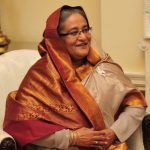Politics
Bangladesh Politics
This page explores Bangladesh’s political structure incorporating real-time RSS feed news and videos. By harnessing the power of RSS feeds, visitors can stay informed about the latest developments in Bangladesh’s politics as they happen. The dynamic nature of these feeds ensures that users receive up-to-the-minute updates on political events, policy changes, and significant milestones, enabling them to stay abreast of the ever-evolving political scene.

Sheikh Hasina
Prime Minister of Bangladesh
Incumbent
Assumed office
6 January 2009
Image credit
Bangladesh operates under a parliamentary democracy political structure. The country is a unitary state with a parliamentary system, where the President serves as the ceremonial head of state, and the Prime Minister is the head of government and holds executive powers. The President of Bangladesh is elected by the Members of Parliament, while the Prime Minister is the leader of the majority party or coalition in the parliament.
The parliament of Bangladesh is a unicameral legislature known as the Jatiya Sangsad. It consists of 350 Members of Parliament who are elected through a first-past-the-post system in individual constituencies. The parliament is responsible for making laws, approving the national budget, and providing oversight of the government’s activities. The Prime Minister, along with the Council of Ministers, leads the government, implements policies, and exercises executive authority. Bangladesh has an independent judiciary that operates separately from the legislative and executive branches. The judiciary is responsible for interpreting and applying the law, ensuring justice, and protecting the rights of individuals. The Supreme Court of Bangladesh is the highest judicial authority in the country and serves as the final appellate court.
While Bangladesh has made significant progress in its democratic processes, there have been concerns raised about issues such as political violence, human rights abuses, and restrictions on freedom of expression. The country continues to work towards strengthening democratic institutions, promoting good governance, and addressing these challenges to ensure a robust and inclusive political structure.



